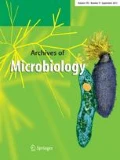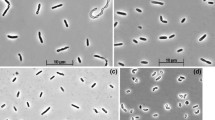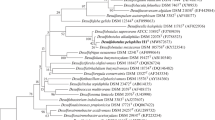Abstract
From anoxic intertidal sediment, a dimethylsulfoniopropionate (DMSP)-cleaving anaerobe (strain W218) was isolated that reduced the acrylate formed to propionate. The bacterium was vibrio- to rod-shaped and motile by means of multiple polar flagella. It reduced sulfate, thiosulfate, and acrylate, and used lactate, fumarate, succinate, malate, pyruvate, ethanol, propanol, glycerol, glycine, serine, alanine, cysteine, hydrogen, and formate as electron donors. Sulfate and acrylate were reduced simultaneously; growth with sulfate was faster than with acrylate. Extracts of cells grown in the presence of DMSP contained high DMSP lyase activities (9.8 U/mg protein). The DNA mol% G+C was 45.1. On the basis of its characteristics and the 16S rRNA gene sequence, strain W218 was assigned to a new Desulfovibrio species for which the name Desulfovibrio acrylicus is proposed. A variety of other sulfate-reducing bacteria (eight of them originating from a marine or saline environment and five from other environments) did not reduce acrylate.
Similar content being viewed by others
Author information
Authors and Affiliations
Additional information
Received: 22 March 1996 / Accepted: 8 May 1996
Rights and permissions
About this article
Cite this article
van der Maarel, M., van Bergeijk, S., van Werkhoven, A. et al. Cleavage of dimethylsulfoniopropionate and reduction of acrylate by Desulfovibrio acrylicus sp. nov.. Arch Microbiol 166, 109–115 (1996). https://doi.org/10.1007/s002030050363
Issue Date:
DOI: https://doi.org/10.1007/s002030050363




